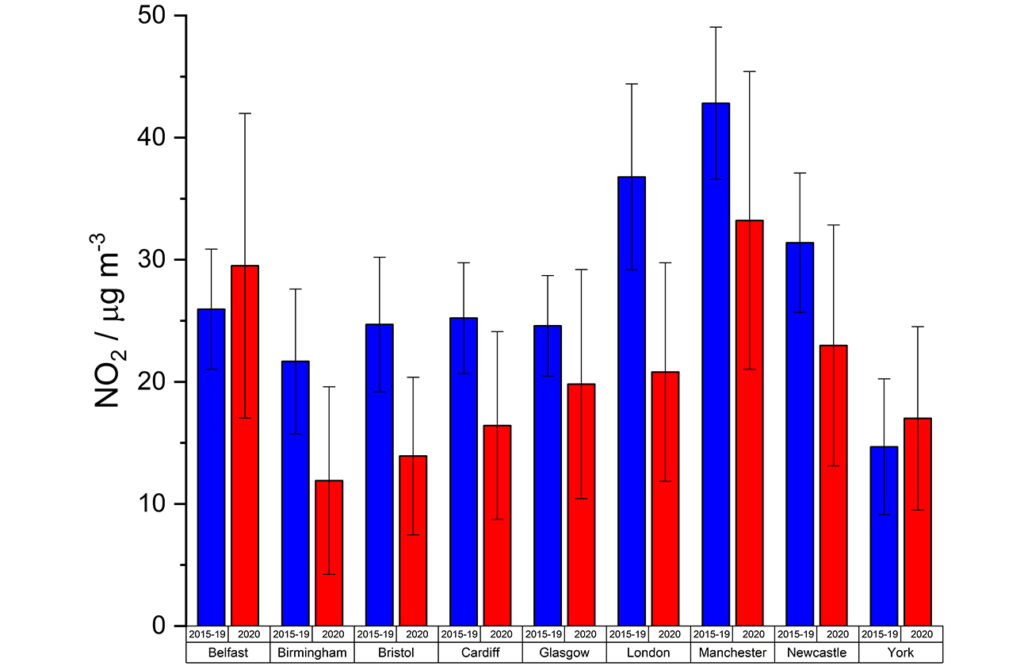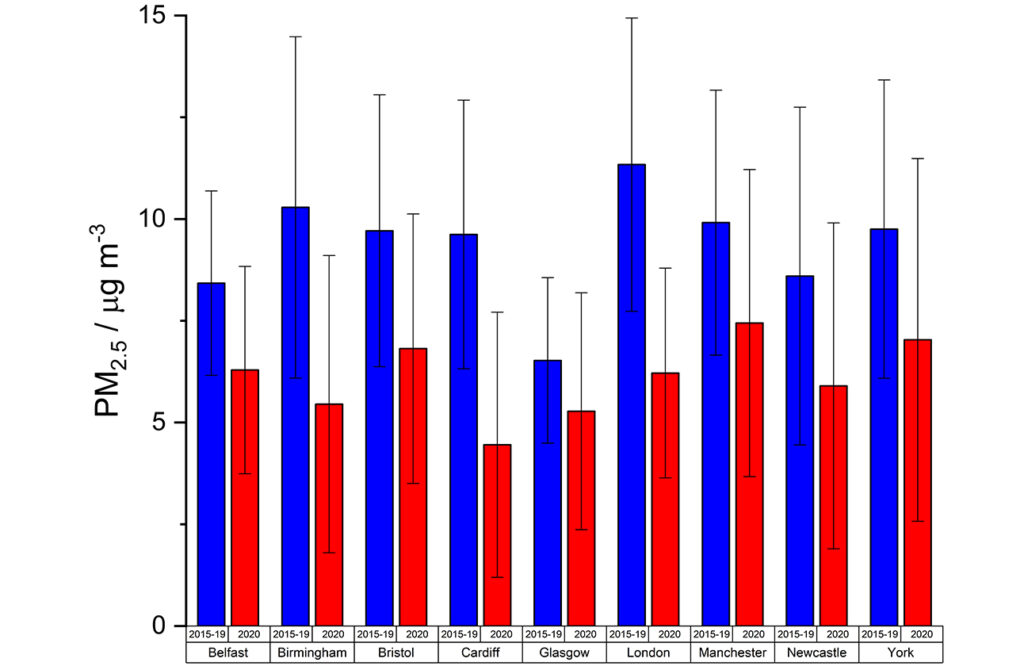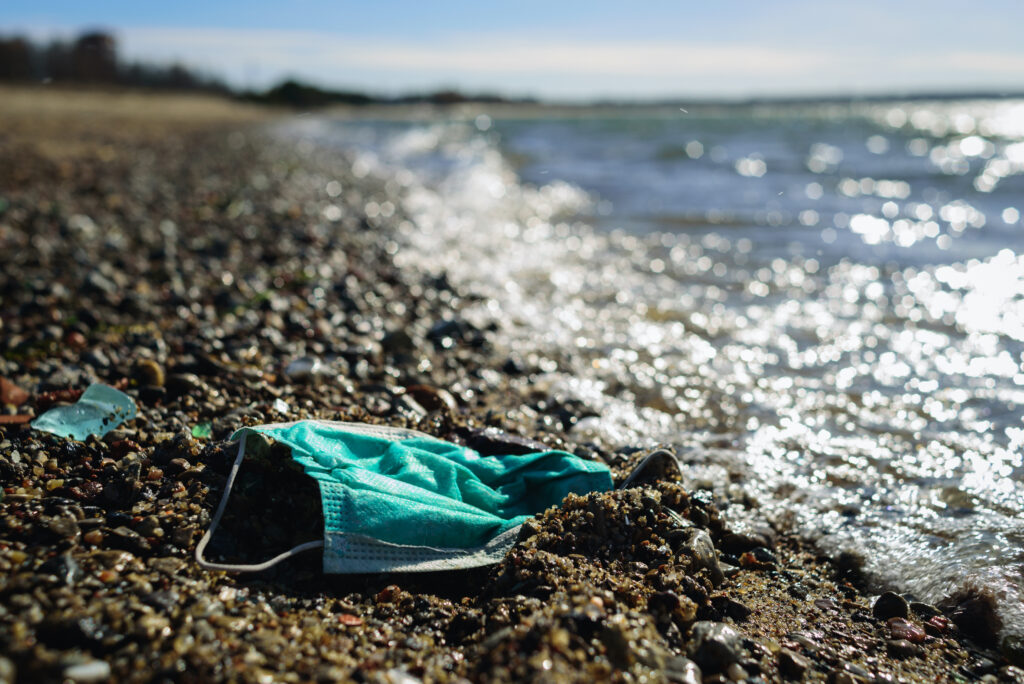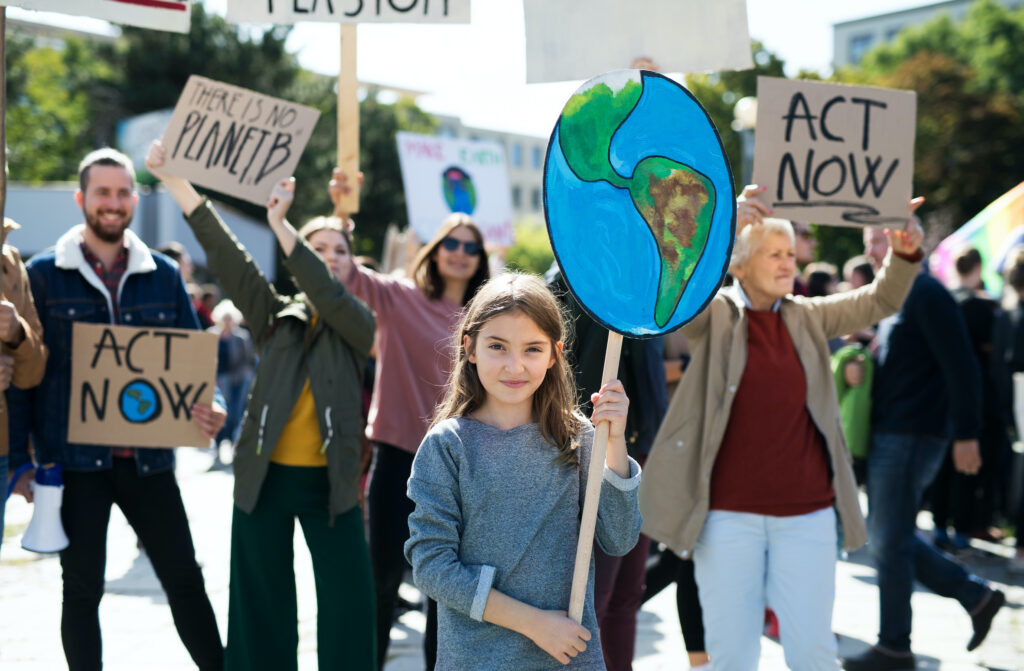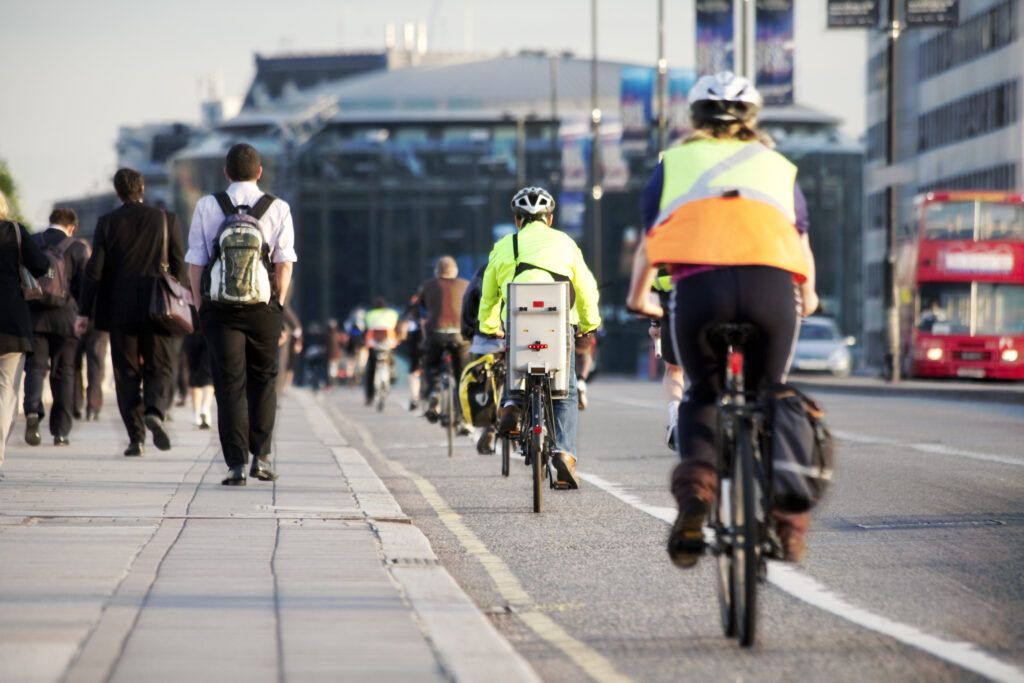This is a guest article and does not necessarily reflect the views and values of Impetus Digital. The original article was created by IGNIFI and can be found here.
We all remember the headlines from the start of lockdown: rivers clearing, roads empty and the levels of pollution dropping. It’s easy to assume there has been an overall positive impact on the environment – but is this the whole story?
Experts have warned that despite the results looking promising, these effects are likely to be temporary, due to the absence of meaningful changes to our infrastructure.1
Here we discuss some of the main ways that this pandemic has impacted the environment both short and long term, alongside the influence of our own industry.
What we’ve seen so far
Reduced water pollution
As countries imposed stricter lockdown conditions, images began to circulate of bodies of water becoming clearer, even to the point where a rich variety of marine life was spotted in Venice’s canals. Research has also demonstrated that the drop in activity from both industry and recreational uses is reducing surface pollution in some bodies of water.2,3
An improvement in air quality
The decrease in emissions caused by the global shutdown also led to a measured decrease in air pollution. In the weeks surrounding lockdown, cities across the UK experienced a drop in both particulate matter and nitrogen dioxide levels when compared to previous years:
Mean NO2 for 2015–2019 and 2020 from 15th Feb–24th Mar
Mean PM2.5 for 2015–2019 and 2020 from 15th Feb–24th Mar
A comparison of NO2 and particulate levels between 2015–2019 and 2020
(National Centre for Academic Science, 2020).
However, while headlines of CO2 emissions being 17% lower than last year have attracted attention,4 it’s worth remembering that even though emissions may be lower than previous years, they are a cumulative issue. Levels may be increasing more slowly, but they are increasing nonetheless, and this is a problem that still requires addressing.
More appreciation for our green spaces
With most of society shutdown, by the time the rules relaxed allowing for unlimited outdoor exercise, many people took the opportunity to explore their local parks and green spaces. Be it trips to inner city parks or hikes in the countryside, hopefully this has made protecting these spaces a priority for many more people.
Medical waste
From single-use PPE to the masks that are now necessary in most indoor environments, coronavirus has caused an increase in medical waste. While reusable cloth masks are recommended, they aren’t always an option. With laws now preventing access to shops without a mask, usage has grown astronomically. Already, masks and gloves have made their way into our rivers and seas.5
In hospitals, another problem is growing, with an increase in potentially infectious medical-grade waste. In Wuhan, China, along with constructing new hospitals for the influx of patients, a new medical waste plant had to be constructed, alongside the introduction of 46 mobile medical waste treatment facilities to cope with the demand.6,7
Looking to the long term
No-one is paying attention to the climate
A key concern amongst scientists is that while distracted by the immediate coronavirus crisis, we have dropped the ball on combating climate change. Restrictions have meant the cancelling of conferences, protests and even prevented scientists from being able to collect data.8
Even the false assumption that lockdowns have created some sort of reset for the Earth could be doing more harm than good. Our current priorities include keeping our distance and stopping the spread of the virus, but this doesn’t always align with our environmental goals.
Relaxing of rules for polluters
With economic difficulty being felt across most sectors, some of the world’s biggest polluters are asking for favours. So far this has resulted in oil, gas and fracking companies receiving economic help and investments.9,10 In some countries, this is coupled with a relaxing in the regulations already in place for these industries. After the 2008 financial crisis, amongst other countries, China attempted to repair their economy through investment in the coal industry,11 and there are already concerns that a similar strategy in 2020 could put a hold on their clean energy initiatives.12
Reduced space means more vehicles
With reduced capacity, enforced use of masks and a general nervousness around being in public, people are opting to drive rather than use public transport.15 While environmental campaigns have pushed for a greater uptake in public transport where possible. Can we really recommend this during a pandemic?
However, as anyone who’s tried to purchase a bike in the last few months will know, cycling is also on the increase. With a record number of people taking up cycling for their daily exercise,13 this provides potential for an alternative to driving. Following this, the government announced initiatives to increase the number of cycle paths, laying the groundwork for a greener way to commute.14 The challenge now is to keep this newfound skill going while the gyms are back open and as the weather cools over the coming months.
What’s happening in our industry?
Amongst many others, our industry has seen a shift from office-based work to working from home, with the ideal side effect being fewer people requiring a daily commute. With many businesses rethinking their leases, 2020 is likely to be a turning point. Coming from a place of necessity when lockdowns were introduced, businesses have implemented real changes to their operations that make employees able to work much more effectively from home.
Another major change in our industry has been the surge in digital transformation. Whether it be remote detailing or online e-congresses, this can significantly impact carbon emissions through travel alongside other benefits such as increasing accessibility.
We’re already reverting
As lockdowns are lifted across regions, a noticeable return to the norm has been witnessed,16 but with no deeper changes to infrastructure, is this a surprise? Perhaps this was a real opportunity to change the way we do things and benefit the environment, but did we miss the boat?
As we start to decide what ‘the new normal’ means for our businesses, this is the perfect opportunity to consider our ethical and environmental goals.
References
- Why COVID-19 will end up harming the environment. National Geographic. https://www.nationalgeographic.co.uk/environment-and-conservation/2020/06/why-covid-19-will-end-up-harming-the-environment. Published June 18, 2020. Accessed August 12, 2020.
- Yunus AP, Masago Y, Hijioka Y. COVID-19 and surface water quality: Improved lake water quality during the lockdown. Sci Total Environ. Published August 20, 2020;731:139012. doi:10.1016/j.scitotenv.2020.139012.
- Lockdown improves water quality of Ganga, Yamuna. The Times of India. https://timesofindia.indiatimes.com/india/lockdown-improves-water-quality-of-ganga-yamuna/articleshow/75456921.cms. Published April 29, 2020. Accessed August 11, 2020.
- Le Quéré C, Jackson RB, Jones MW, et al. Temporary reduction in daily global CO2 emissions during the COVID-19 forced confinement. Nat Clim Chang. Published May 19, 2020;10(7):647-653. doi:10.1038/s41558-020-0797-x.
- “More masks than jellyfish”: coronavirus waste ends up in ocean. The Guardian. https://www.theguardian.com/environment/2020/jun/08/more-masks-than-jellyfish-coronavirus-waste-ends-up-in-ocean. Published June 8, 2020. Accessed August 12, 2020.
- SOE to build medical waste disposal center in Wuhan. China Daily. https://www.chinadaily.com.cn/a/202002/07/WS5e3d152ca310128217275d44.html. Published February 7, 2020. Accessed August 12, 2020.
- Coronavirus leaves China with mountains of medical waste. South China Morning Post. https://www.scmp.com/news/china/society/article/3074722/coronavirus-leaves-china-mountains-medical-waste. Published March 12, 2020. Accessed August 12, 2020.
- Will Covid-19 have a lasting impact on the environment? BBC Future. https://www.bbc.com/future/article/20200326-covid-19-the-impact-of-coronavirus-on-the-environment. Published April 22, 2020. Accessed August 17, 2020.
- Friends of the Earth. The Big Oil Money Pit: How $750 Billion in New Stimulus Spending Could Prop up Failing Polluters; Published April 15, 2020. https://ieefa.org/ieefa-update-oil-majors-paid-216-billion-more-to-shareholders-than-they-earned-directly-from-business-over-the-past-decade/. Accessed August 17, 2020.
- Surging coal use in China threatens global CO2 goals. E and E News. https://www.eenews.net/stories/1063354565. Published June 9, 2020. Accessed August 17, 2020.
- Economic Recovery After COVID-19. World Resources Institute. https://www.wri.org/blog/2020/03/coronavirus-economy-low-carbon-investments. Published March 12, 2020. Accessed August 17, 2020.
- China expands coal plant capacity to boost post-virus economy. Financial Times. https://www.ft.com/content/cdcd8a02-81b5-48f1-a4a5-60a93a6ffa1e. Published June 29, 2020. Accessed August 17, 2020.
- Bike shop finance sales rocketed to £60 million in April. Cycling Industry News. https://cyclingindustry.news/bike-shop-finance-sales-rocketed-to-60-million-in-april/. Published May 12, 2020. Accessed August 12, 2020.
- £2 billion package to create new era for cycling and walking. GOV UK. https://www.gov.uk/government/news/2-billion-package-to-create-new-era-for-cycling-and-walking. Published May 9, 2020. Accessed August 12, 2020.
- Commuters choose cars over public transport to avoid exposure to coronavirus. Automotive News Europe. https://europe.autonews.com/automakers/commuters-choose-cars-over-public-transport-avoid-exposure-coronavirus. Published May 11, 2020. Accessed August 12, 2020.
- Air pollution in China back to pre-Covid levels and Europe may follow. The Guardian. https://www.theguardian.com/environment/2020/jun/03/air-pollution-in-china-back-to-pre-covid-levels-and-europe-may-follow. Published June 3, 2020. Accessed August 17, 2020.
About IGNIFI
IGNIFI is an independent creative and marketing agency devising and implementing effective engagement with healthcare professionals and consumers for leading human and animal health brands. To learn more about IGNIFI, visit their website or follow them on LinkedIn or Twitter.
About Impetus Digital
Impetus Digital is the spark behind sustained healthcare stakeholder communication, collaboration, education, and insight synthesis. Our best-in-class technology and professional services ensure that life science organizations around the world can easily and cost-effectively grow and prosper—from brand or idea discovery to development, commercialization, execution, and beyond—in collaboration with colleagues, customers, healthcare providers, payers, and patients.



